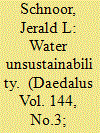| Srl | Item |
| 1 |
ID:
139819


|
|
|
|
|
| Summary/Abstract |
Water is a vital renewable resource that is increasingly stressed by multiple and competing demands from people, industry, and agriculture. When water becomes unavailable or unusable, life itself cannot be sustained. Changes in supply and demand for water are driven by population growth, climate change, and our energy and land use choices. Poverty frequently precludes the ability of many people to respond and adapt to water insecurity. In this essay, we discuss the effects of these drivers on the diminution of rivers, aquifers, glaciers, and the severe pollution that renders some water resources unusable. While technologies for water reuse, desalination, aquifer replenishment, and better water pricing are important solutions, the recognition of water as a profoundly threatened resource and as a basic human right is essential for providing sustainable water for future generations.
|
|
|
|
|
|
|
|
|
|
|
|
|
|
|
|
| 2 |
ID:
107626


|
|
|
|
|
| Publication |
2011.
|
| Summary/Abstract |
Extracting, delivering, and disposing water requires energy, and similarly, many processes for extracting and refining various fuel sources and producing electricity use water. This so-called 'water-energy nexus', is important to understand due to increasing energy demands and decreasing freshwater supplies in many areas. This paper performs a country-level quantitative assessment of this nexus in the MENA region. The results show a highly skewed coupling with a relatively weak dependence of energy systems on fresh water, but a strong dependence of water abstraction and production systems on energy. In case of Saudi Arabia it is estimated that up to 9% of the total annual electrical energy consumption may be attributed to ground water pumping and desalination. Other countries in the Arabian Gulf may be consuming 5-12% or more of total electricity consumption for desalination. The results suggest that policy makers should explicitly consider energy implications in water intensive food imports and future restructuring of water demand. This will help in making more integrated decisions on water and energy infrastructure systems. An integrated assessment may in some cases favor water reuse and changes in the agricultural sector as opposed to the expansion of energy intensive and financially expensive desalination systems.
|
|
|
|
|
|
|
|
|
|
|
|
|
|
|
|